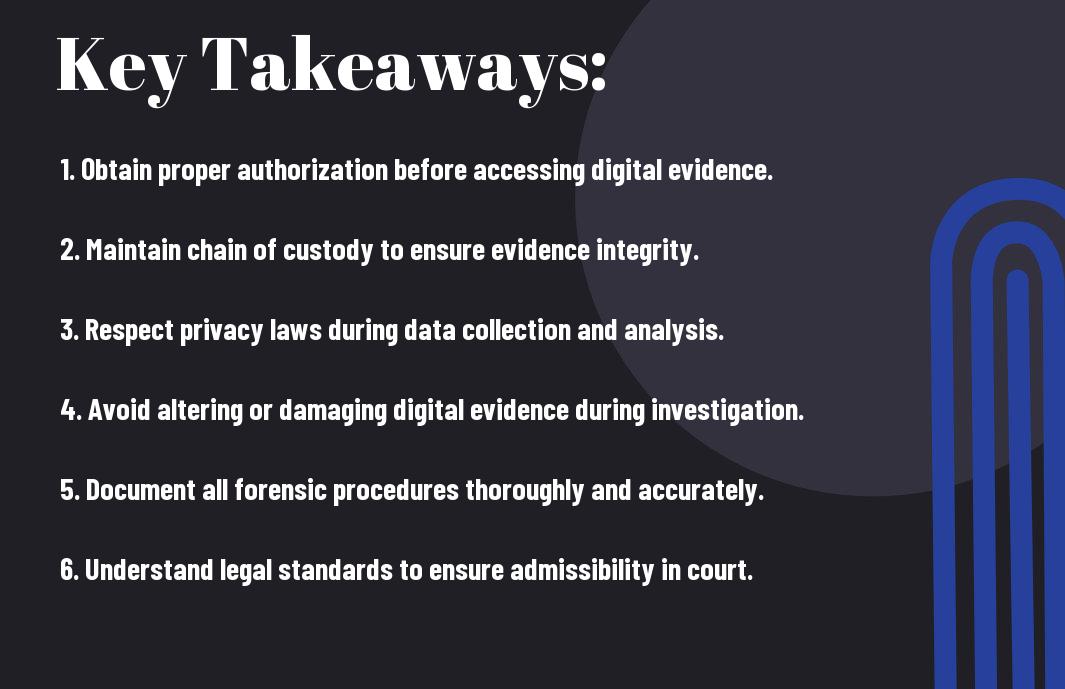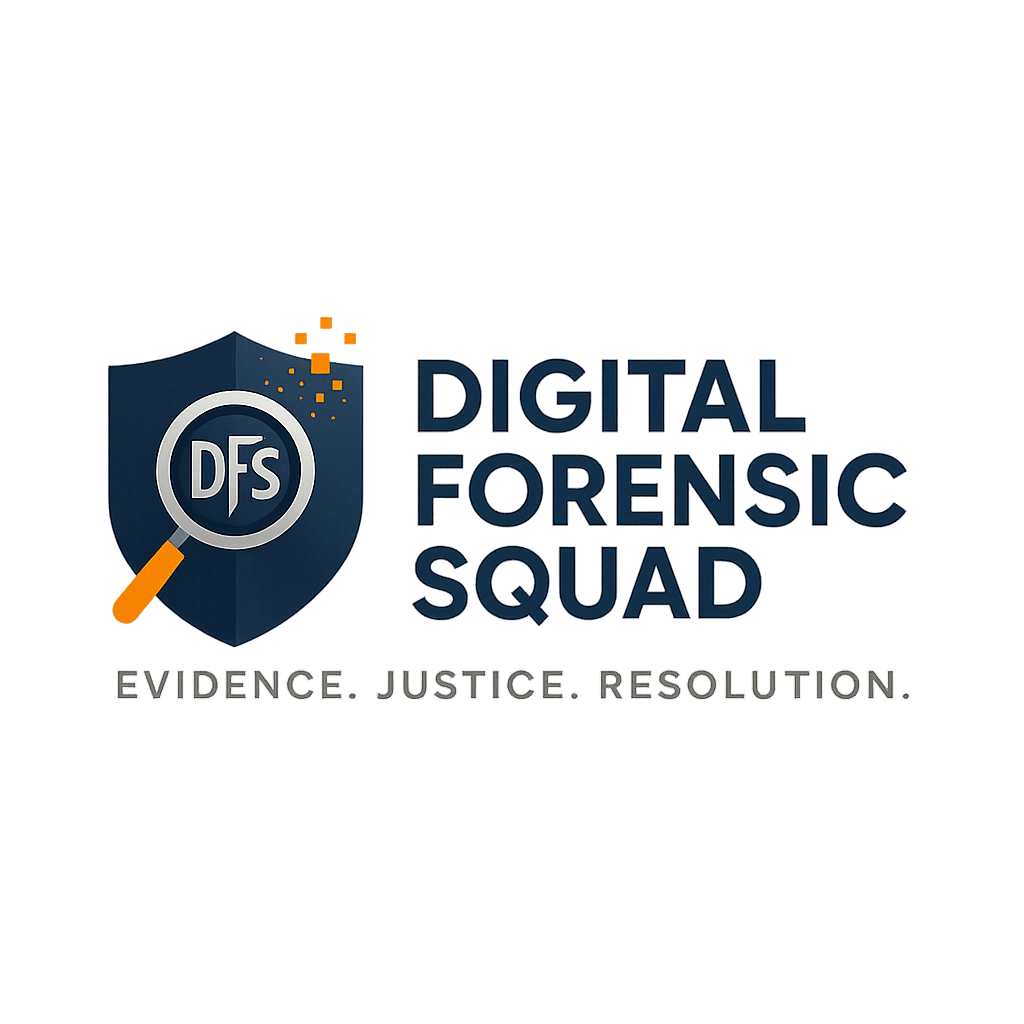Ethical practices in digital forensics are necessary for maintaining the integrity of the investigative process. As you launch on your journey in this field, it’s important to understand the legal frameworks that govern your work, as well as the ethical obligations you face. Navigating the complex interplay between technology and law requires a solid grasp of concepts such as privacy rights, data handling protocols, and the impact of your findings. By adhering to these principles, you can enhance your credibility and contribute positively to the pursuit of justice. Visit Digital Forensic Squad to learn more about latest trends in digital forensics.
Key Takeaways:
- Understanding the legal framework is important, as digital forensics operates within a complex web of laws regarding privacy, data protection, and admissibility in court.
- Ethical practices in digital forensics involve ensuring the integrity of evidence, maintaining confidentiality, and respecting the rights of individuals while conducting investigations.
- Awareness of organizational policies and procedures is important, as different entities may have specific guidelines regarding digital evidence handling and forensic analysis.
Overview of Digital Forensics
Before stepping into the complexities of digital forensics, it’s necessary to grasp what this field encompasses. Digital forensics is the process of recovering, preserving, and analyzing electronic data from devices like computers and smartphones to investigate cyber crimes or misconduct. Understanding its core principles enables you to appreciate its role in today’s digital landscape and how it impacts legal proceedings and ethics.
Definition and Importance
Against the backdrop of increasing cybercrime rates, digital forensics serves as a vital tool in investigating and resolving online misconduct. This field not only aids law enforcement in gathering evidence but also helps organizations secure their data integrity and safeguard against cyber threats. By understanding digital forensics, you empower yourself to navigate the digital world more safely.
Key Concepts in Digital Forensics
Overview of digital forensics involves several key concepts that define how investigations are conducted. You should familiarize yourself with terms such as data acquisition, which refers to the collection of digital evidence, and chain of custody, ensuring that evidence is preserved and documented properly. Other necessary aspects include analysis techniques for interpreting data and reporting, which provides clear findings of the investigation. Mastering these concepts lays the groundwork for effective digital forensics practices.
Even as you explore the fundamentals of digital forensics, understanding the interplay among its key concepts is necessary. The process of data acquisition establishes the foundation for subsequent analysis, while maintaining an unbroken chain of custody ensures that the evidence remains credible in legal contexts. Without proper analysis, vital information may be overlooked, so honing your analytical skills is imperative. Lastly, comprehensive reporting of your findings not only informs stakeholders but also reinforces your legitimacy as a digital forensics professional.


Legal Framework
You need to understand that the legal framework surrounding digital forensics is complex and varies significantly by jurisdiction. This framework includes a mix of federal, state, and international laws that dictate how digital evidence can be collected, analyzed, and presented in court. Ensuring compliance with these laws is imperative for maintaining the integrity of your investigation and protecting your findings from legal challenges.
Relevant Laws and Regulations
Between the myriad of laws, you’ll find key regulations such as the Computer Fraud and Abuse Act (CFAA) and the Electronic Communications Privacy Act (ECPA), among others. These laws set the boundaries for what is permissible when it comes to computer access and data privacy, emphasizing the importance of adhering to legal guidelines in your digital forensics work.
Jurisdictional Challenges
Relevant to your practice, jurisdictional challenges can complicate digital forensic investigations significantly. Different laws apply based on the location of the crime, the data, and the individuals involved, leading to potential conflicts between enforcement agencies. Navigating these complexities requires a solid understanding of both domestic and international laws to ensure that your evidence is not only valid but also legally admissible in court.
And while jurisdictional differences can pose challenges, they also present opportunities for forensic experts who can demonstrate their understanding of the legal landscape. The results of your investigations may be affected if evidence is collected under the wrong jurisdiction or if procedures aren’t followed correctly. By paying close attention to local laws, maintaining detailed documentation, and collaborating with legal professionals, you can mitigate these risks and enhance the credibility of your findings in any jurisdiction.
Ethical Considerations
Many individuals entering the field of digital forensics must navigate complex ethical landscapes. It is vital to maintain integrity and professionalism while handling sensitive data, as your actions can have significant ramifications for individuals and organizations involved in investigations. Upholding ethical standards ensures that you contribute positively to the community and are respected in the field.
Professionals’ Code of Ethics
Beside understanding legal guidelines, you should also adhere to a professionals’ code of ethics, which emphasizes honesty, respect, and responsibility. This code serves as a foundation for your work and guides your decision-making processes, ensuring that your forensic practices align with the highest ethical standards.
Confidentiality and Privacy Issues
Behind every digital forensics investigation lies a myriad of confidentiality and privacy concerns. You are often dealing with sensitive information, and prioritizing the protection of this data is paramount to maintaining trust and legality.
Also, you must be aware that breaches of confidentiality can lead to severe consequences, including legal actions against you or your organization. Handling personal information without proper authorization can infringe upon individuals’ privacy rights, damaging your reputation and the integrity of your work. Engaging in ethical practices means implementing strict protocols for data handling, ensuring all investigative actions respect the privacy of individuals involved, and obtaining necessary permissions whenever required. Ethical commitment not only demonstrates professionalism but also upholds the standards of the forensic community.
Evidence Handling
For digital forensics, proper evidence handling is paramount to ensuring that your findings are valid and can be used in a court of law. This involves meticulous processes for collecting, preserving, and analyzing digital data while adhering to legal and ethical standards. Any mismanagement of evidence can lead to contamination or dismissal in legal proceedings, making it vital for you to follow established protocols throughout your investigation.
Best Practices for Data Collection
An effective data collection process should start with creating an action plan that outlines the steps needed to gather evidence. Utilize write-blockers to prevent any alterations to the original data and always work from a copy of the data to avoid tampering. Document every step meticulously to maintain an accurate record of how evidence was collected, ensuring that nothing is lost in the process.
Chain of Custody
Evidence in digital forensics must be tracked through a chain of custody to maintain its integrity and reliability. This involves documenting every person who handles the evidence, alongside any transfers that occur throughout the investigation. Each entry must include the date, time, and rationale for the handover, creating a transparent trail that reinforces the evidence’s authenticity.
Custody of evidence is a fundamental aspect of digital forensics, as a well-maintained chain of custody serves to prove that the data has not been altered or tampered with since its collection. Any breaks in this chain can lead to serious implications for your case, including potential dismissal of evidence in court. You must keep each transfer documented, and both your personal and the organization’s responsibility for the evidence clear. This not only protects the integrity of the data but also upholds the legal standards necessary for your findings to be admissible.
Reporting and Documentation
All digital forensics investigations require meticulous reporting and documentation to uphold integrity and trustworthiness. Your findings must be presented clearly to ensure that they can be understood by various stakeholders. Therefore, you should adhere to ethical standards while compiling reports that not only outline the technical details but also convey the importance of privacy rights. For further insights, check out Ethical Considerations in Digital Forensics: Balancing ….
Importance of Accurate Reporting
Beside preserving the integrity of your work, accurate reporting ensures that all parties involved in the investigation can rely on your findings. It helps in building a comprehensive narrative that substantiates your conclusions and can assist in legal proceedings, where clarity and detail are important.
Legal Implications of Documentation
Documentation of your procedures and findings will ultimately impact the way your investigation is perceived in legal contexts. Further, inaccurate or incomplete documentation can lead to severe legal ramifications, including the potential for case dismissal or penalties. Your documentation must encompass detailed logs of your methodologies, chain of custody for evidence, and any interactions that occur during the investigation to protect the admissibility of your findings and safeguard against claims of misconduct. This acts as your shield, safeguarding both your reputation and the legitimacy of your work.
Emerging Technologies and Challenges
Keep abreast of the rapid advancements in technology that significantly impact digital forensics. As digital devices evolve, so too do the methodologies and tools used to investigate cybercrimes. Understanding these emerging technologies will prepare you for the challenges that may arise as you conduct forensic examinations, ensuring that you remain compliant with legal and ethical standards.
Impact of AI and Machine Learning
Impact of AI and machine learning on digital forensics is profound. These technologies enhance your capacity to analyze vast amounts of data quickly and accurately, improving evidence collection and analysis. However, they also raise ethical questions regarding privacy and bias, necessitating a careful balance as you leverage their benefits in forensic investigations.
Cybersecurity Threats to Digital Forensics
About cybersecurity threats to digital forensics, it’s crucial to acknowledge the increasing risks posed by cyber adversaries. As you research into investigations, you may find that cybercriminals employ sophisticated techniques to manipulate evidence or destroy critical data, which can compromise your findings and legal actions.
Even in the landscape of digital forensics, you face significant challenges from cybersecurity threats. Attackers may launch ransomware and other malicious activities aimed at corrupting or erasing evidence, which undermines your efforts to maintain integrity and trust in your findings. Moreover, these threats can lead to data breaches that expose sensitive information, further complicating your investigations. Staying updated on the latest cybersecurity protocols and adopting robust security measures is vital to protect both your work and the integrity of the judicial process.
Summing up
With this in mind, you should approach digital forensics with a firm understanding of both legal and ethical considerations. Being aware of privacy laws, consent, and the implications of your actions not only protects you but also upholds the integrity of your work. Ensuring that your methods are compliant with regulations will help you maintain credibility in the field and build trust with clients and stakeholders. As you continue your journey in digital forensics, keep these principles at the forefront of your practice.
FAQ
Q: What are the primary legal considerations for beginners in digital forensics?
A: Beginners in digital forensics should be aware of several key legal considerations, including obtaining proper authorization for data collection, understanding the relevant laws and regulations related to privacy and data protection, and ensuring that evidence is collected, preserved, and analyzed in a manner that is admissible in court. It is crucial to familiarize oneself with local, national, and international laws that pertain to cybercrime, as well as understanding the implications of the Fourth Amendment in the U.S., which protects against unreasonable searches and seizures. Additionally, beginners should consider how the Data Protection Act and GDPR affect the handling of personal data during forensic investigations.
Q: How do ethical considerations apply to digital forensics?
A: Ethical considerations in digital forensics revolve around the integrity of the investigative process and respect for individuals’ privacy. Forensic professionals must navigate situations where data may be sensitive or confidential, requiring them to balance the need for investigations with the rights of individuals. It is crucial to adopt a code of ethics that emphasizes honesty, objectivity, and professionalism. This includes avoiding unauthorized access to data, maintaining confidentiality of sensitive information, and ensuring that any digital evidence handled is treated with respect and integrity throughout the analysis process. Ethical dilemmas may arise, and having established principles can help guide practitioners in making appropriate decisions. Visit Digital Forensic Squad to learn more about applications of digital forensics.


